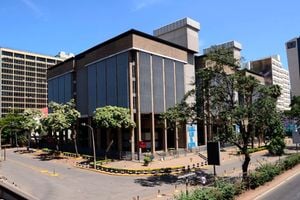
FILE PHOTOS | NMG
Turf wars between the Central Bank of Kenya (CBK) and the Treasury’s Public Debt Management Office (PDMO) are undermining efforts to bring down the cost of government borrowing, according to sources familiar with the operations of the two agencies.
Insiders at the PDMO say the unit is uncomfortable with the CBK’s “overbearing” role as a government’s fiscal agent and partly blames the apex bank for the high cost of government debt that has seen interest rates on treasury bonds rise to as high as 18 percent due to its frosty relation with commercial banks.
President William Ruto has directed debt managers to ensure rates on government debts don’t rise beyond 10 percent.
The sources told the Business Daily that operations at the PDMO risk disruption as technocrats, under pressure from the Executive to lower the cost of state borrowing, continue to grapple with limited space to make debt-related decisions, including the appointment of fiscal agents away from the CBK.
Clashing financial laws have granted powers to both the CBK and the PDMO to borrow on behalf of the government from the domestic market through the issuance of Treasury bills and bonds, creating a conflict between the two.
Reports of disquiet within the PDMO come even as the government ignored crucial advice from the International Monetary Fund (IMF) and the World Bank to distinctively separate the monetary policy, fiscal policy, and debt management roles to avert potential conflict of interest between the CBK, National Treasury and the PDMO.
“The solution is to have the right legal environment that gives institutions powers to have an impact and allows the people inside these institutions to be the best they can be. How do you make a decision when you are not an accounting officer?” a source privy to the operations at the debt office said.
“This country has no systems. If we did not have the International Monetary Fund (IMF) in place this country could be on its knees.”
The PDMO boss, Haron Sirima, has already bowed to the pressure of the turf wars and is on his way out after he chose not to renew his contract.
The public finance management law gives the PDMO's Director General powers to act as the principal issuer of government securities on behalf of the Treasury, while the CBK Act grants CBK powers to be the government’s fiscal agent.
“This sense of engagement of the central bank as a fiscal agent has brought a lot of complexities in the way debt management is being done in this country. We could do far better than this. Fiscal agency control is a subsidiary function to CBK’s main function of monetary policy control,” the source said.
“The engagement between the central bank and the market (credit providers) at the fiscal agency level is that of fear. This fear is generated from the bank’s monetary policy kind of operations. I believe CBK should not take that position (fiscal agent of the government), it should be appointed at the discretion of the Treasury or PDMO.”
Efforts to secure comments from CBK on this matter did not bear fruit as Governor Kamau Thugge did not respond to our emailed questions.
The public finance management law requires the Cabinet Secretary for the National Treasury to delegate to the Head of the PDMO the operational decisions on borrowing and debt management and the day-to-day management of the Office.
Economists believe the CBK should concentrate on its regulatory role and surrender the debt management functions to the PDMO.
“The Treasury should be in charge of all aspects of fiscal policies and if banking services are needed then there should be a government corporation that performs this function. This is the model in the United States where there is a Federal Financing Bank that operates in the US Treasury,” says Ken Gichinga, Chief Economist at Mentoria Economics.
“Central banks should only be mandated with implementing monetary policy.”
In 2001 the IMF and the World Bank staff through a paper titled ‘Guidelines for Public Debt Management’ said transparency in the mandates and clear rules and procedures in the operations of the central bank and Ministry of Finance can help resolve conflicts between monetary policy and debt management policies and operations.
“Transparency and simplicity in debt management operations and the design of debt instruments can also help issuers reduce transaction costs and meet their portfolio objectives,” they said. “They may also reduce uncertainty among investors, lower their transaction costs, encourage greater investor participation, and over time help governments lower their debt servicing costs.”
According to the Bretton Woods institutions, there should be a separation of debt management and monetary policy objectives and accountabilities where the level of financial development allows since clarity in the roles and objectives for debt management and monetary policy minimises potential conflicts.
Dr Haron Sirima who has been at the helm of Kenya’s debt management unit since June 2018, has confirmed his exit from the debt office.
In 2021 The Public Debt Management Authority Bill (2020) was introduced in Parliament proposing to establish a Public Debt Management Authority to take over from the Central Bank the function of issuing government public debt securities (Treasury bills and bonds) on behalf of the national and county governments.
Currently, the Treasury pays the CBK 1.5 percent, or up to Sh3 billion ($18.75 million) in fees for each debt raised from the domestic market through Treasury bills and bonds.
According to the Bill, the PDMA was also to be in charge of implementing the government’s public debt management policy of minimising its financing costs over the long term, taking account of risk, and formulating policies, strategies, and procedures to be employed by the Authority in achieving its objectives.
The Private Members Bill introduced in Parliament by the former Nambale MP John Bunyasi also provided that due diligence be carried out on the government’s debt-funded projects in terms of their actual costs and economic returns, to avert further loss of taxpayers’ funds through inflated costs by corrupt State officers.
Kenya’s public debt has surpassed Sh10.5 trillion ($65.62 billion) and almost half of the revenues collected go towards the repayment of this debt.
Of this debt, $2 billion worth of Eurobond is maturing in June this year, with uncertainties surrounding the plan by the government to buy back part of the debt before maturity.












